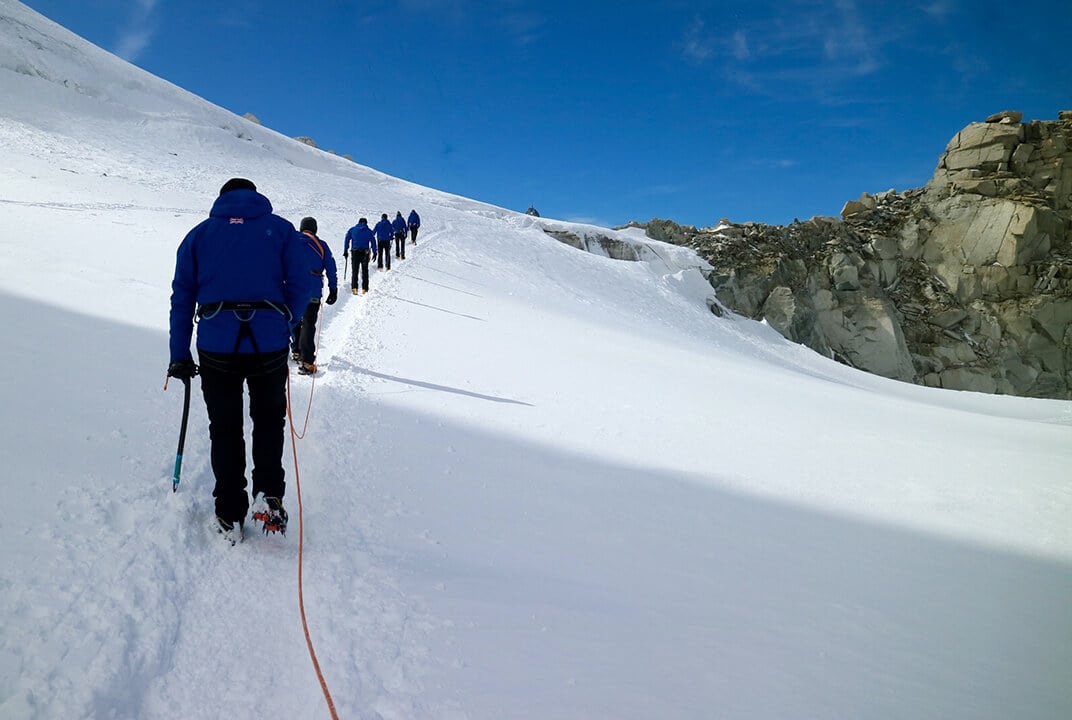Insight | ‘The more I challenge myself, the more I recover’
‘The more I challenge myself, the more I recover’
Government
On the eve of climbing Everest, 65 Degrees North team member Joe Winch gives an unflinching account of life with PTSD.
Inmarsat is satellite communications sponsor of 65 Degrees North, the organisation that promotes rehabilitation through adventure for injured service personnel. The latest expedition, starting this week, will see a team of six attempt to summit Mount Everest.
Before I was diagnosed with acute Complex Post Traumatic Stress Disorder, I was enjoying a very successful career as an Officer in the Royal Marines, I was a proud husband and father, and I was optimistic and excited about the future.
But then almost 10 years to the day after my first deployment to Afghanistan, life quite suddenly became incredibly difficult. I was struggling to sleep, I couldn’t focus, and I was withdrawing from my family – which is very unlike me.
Within a few short months it had become far more acute, but I persevered – until life really came off the rails. Fortunately, around this time, I had a routine hearing test. I sat in a small soundproof booth and a series of pitches were played into my ears, and suddenly it felt like a bomb had gone off.
I became very aware of how sensitive to noise I was – not loud noise, just noise in general. It would send electric shocks throughout my body, causing my eyes to close, my head to pound, my heart to explode, and the anger would always follow. So I made an appointment with my doctor, who eventually informed me that what I had experienced during the hearing test was in fact a flashback, and that I was suffering from an acute response to some prior traumatic experience – I had Post Traumatic Stress Disorder (PTSD), and I had it very badly.
At first, I couldn’t believe this. Throughout my career I had looked at others around me and thought that if they weren’t suffering, then I couldn’t possibly be suffering. But in the days after my diagnosis, I slowly realised how flawed this view was, because, firstly, I had no idea whether those others were suffering or not (and, as it would turn out, many of them were), and secondly, in considering our experiences at war I was comparing the hyper-abnormal with the hyper-abnormal, and in so doing I had unhinged myself from, and lost all reference to, normal life.
And this realisation was extremely disorientating, because I suddenly became aware, for the very first time, that I had experienced an extraordinary amount of trauma and that the volume and frequency of those traumas had done an incredible amount of damage to my brain and body. And as I came to understand all this, the life that I had led to that point – where I knew with confidence who I was, what I had done, and where I was going – disintegrated.
Treating PTSD can be straightforward where the trauma is isolated and obvious, like a car crash. But with chronic trauma, treatment is far more complicated and recovery a lot less certain – which is the reality that many of us suffering from PTSD in the military face: one can’t just miraculously ‘unhave’ years of trauma. We have to embark upon a journey to rediscover who we are, and how to live, all over again.
This is far more than a clinical process. It goes on forever and happens everywhere. And so as time went on the challenge for me became one of constantly seeking out a ‘place’ that would offer me the opportunity to carry on my recovery in a safe and constructive environment, surrounded by understanding and supportive people.
It was the mountains that I wanted to escape to – that is where I have always felt most comfortable. Yet since getting unwell, I had lacked both the confidence and the opportunity to do this safely – the obvious risk being that I might simply never return.
That is why 65 Degrees North is so important – because they offer us the chance to dramatically break out of the mundane, exhausting, and incredibly tedious routine of recovery, and instead they spectacularly propel our recoveries forward.
My own recovery has been painfully slow and very difficult, but since the opportunity to climb the highest mountain in North America, it has been given a new and exciting energy and purpose; I have rediscovered my enthusiasm for life, and my confidence and self-esteem has returned in abundance, helping me to gently push the boundaries of my symptoms and carve out that new life for me and my family.
And the more I challenge myself, the more I learn and discover, so the more I recover, and the better I become. So for me, climbing Everest is about proving that with determination and support, it is entirely possible to overcome even the worst psychological injuries of war. Thanks to 65 Degrees North, my wife has a husband again, my children have a father again, and I have a life and a future again – which is the greatest gift anyone can ever give.
About the author
Joe Winch was commissioned into the Royal Marines in 2002, and was diagnosed with acute Complex PTSD 15 years later. He is currently under the care of the Royal Navy’s Recovery Centre Hasler, where his treatment has given him a thorough understanding of his symptoms and, together with the incredible support of his family, enabled him to begin taking back control of his life. Joe participated in the 65 Degrees North expedition to Denali in June 2018.


